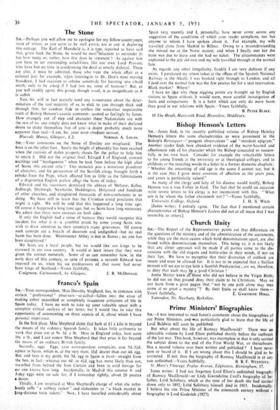The Stone
Sta.—Perhaps you will allow me to apologise for my fellow-countrymen, must of whom, as you seem to be well aware, are at one in deploring this outrage. The Earl of Mansfield is. it is true, reported to have said that, given back the Stone, he would be most reluctant to surrender it: but how many or. rather, how few does he represent ? As against him you have to set outstanding notabilities, like our own Lord Provost, who have lost no time in condemning the deed as utterly disloyal. There are also, it must be admitted, those who treat the whole affair as a colossal jest: for example, wten listening-in to Dr. Don's most moving broadcast, 1 had occasion to rebuke somebody for bursting into ribald mirth, only to be asked if I had lost my sense of humour ! But, as you will readily agree, this group, though vocal, is as insignificant as it is oafish
You, Sir, will in fact scarcely need any reassurance about the deter- mination of the vast majority of us to stick to you through thick and through thin; for candour bids us confess the somewhat unpalatable truth of Bishop Henson's caustic comment—quoted so feelingly by Janus. How strangely out of step and character these Nationalists are with the rest of us: one simply does not know what to make of their declared desire to shake themselves free of you—a desire probably much more apparent than real.-1 am, Sir, your most obedient servant, SIR,—Your comments on the Stone of Destiny are misplaced. The boot is on the other foot. Surely the height of absurdity has been reached when the receiver of stolen property shouts for the police to help him to retain it. Did not the original thief, Edward I of England, commit sacrilege and " hooliganism " when he took from before the high altar of Scone this ancient relic ? This monarch was a notorious plunderer of churches, and his persecution of the Scottish clergy brought forth a rebuke from the Pope, which affected him as little as the fulminations of a disgruntled English prelate affect the Scots of today. Edward and his successors destroyed the abbeys of Melrose, Kelso, Jedburgh, Dryburgh, Newbattle. Haddington, Holyrood and hundreds of other churches, and slaughtered thousands of non-combatants in so doing. We have still to learn that the Christian creed proclaims that might is right. We will be told that this happened a long time ago. Of course it happened a long time ago, but we Scots have long memories. We admit that there were excesses on both sides.
11 only the English had a sense of humour they would recognise this incident for what it is—a youthful prank by some young Scots who wish to draw attention to their country's many grievances. Of course such cantrips arc a breach of decorum and undignified—but no real harm has been dune. Westminster Abbey is not in flames ; no one has been slaughtered.'
We Scots are a loyal people, but we would like our kings to be crowned in our own country. It would at least insure that they were given the correct numerals. Some of us can remember how, in the early days of this century, in spite of protests, a seventh Edward was imposed on us. when his six predecessors of that name had never been kings of Scotland.—Yours faithfully,






































 Previous page
Previous page